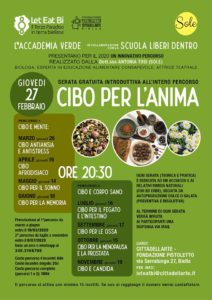A healthy mind in a healthy body: the famous Latin phrase by Giovenale is often quoted when talking about conscious food consumption, and refers to a balance between mind and body. Let Eat Bi’s new initiative – in the context of the Green Academy and in collaboration with Scuola Liberi Dentro – will focus on this harmonic relationship, touching in particular on the world of food. It is a series of talks divided in two modules called Food and mind and Food and a healthy body, held monthly till November in the spaces of Fondazione Pistoletto. The speaker at all the evenings will be Dr. Antonia Tosi (a.k.a. Sole), a biologist and an actress, an expert in conscious food education and theatre, who will share her scientific knowledge and artistic skills throughout the themed evenings. The first in the series of meetings, Food for the soul, programmed for Thursday 27th February, will introduce this particular aspect: it won’t be a simple presentation of the following events, but an encouragement for the participants to put a part of themselves into play (the soul) using theatralisation as an educational language; the seminar won’t therefore delve into the theme of food straight away, but rather present Sole’s theatrical modus operandi. In general, each session will include a theoretical part, for example a debate about aches and pains, and foods and herbs as their cures, and a practical part of autoproduction, in which everybody will experiment with preparing natural remedies to prevent certain illnesses. As per their titles, the topics of the talks in the module Food and mind will be food against anxiety and stress, helping memory and sleep, aphrodisiac; in the section Food and a healthy body the discussion will focus on foods good for the bones, liver and intestine, yeast infection, menopause and prostate.
We spoke to Dr. Antonia Tosi, who disclosed to us part of the contents of some of the talks, for example the one about food good for the liver and intestine: “The liver – she said – is often forgotten when taking care of ourselves, but it’s very important because it renews red blood cells, detoxes the body and stores glycogen, just to mention a few of its functions: it must therefore be kept healthy. The same is true for the intestine, which is at the basis of the functioning of all the other organs. Constipation is for example an alarm bell: the body is telling us that something is not working properly”. How can we guarantee its functionality? “My advise – Sole answered – is to always chew well, to regularly exercise, to eat mainly raw food and seasonal fruit and vegetables; in general, I suggest we consume only truly whole food, the one containing bran. Avoid sugar (saccharose), because it acidifies the body (savour the sweetness of ripe or dried fruit instead). All refined foods – like 00 flour and white rice – are a big no no, because they have a high glycemic index and they don’t satisfy your appetite. What’s more – the expert added – we have to reduce the consumption of gluten: sooner or later our body will tell us that enough is enough! A diet poor in this protein improves our memory, our resistance to fatigue, our predisposition to face stress and fight anxiety”.
But the initiative is not only about advising on what to eat, its objective is also to draw the participants’ attention to the food itself, which is at the basis of a healthy life. According to the lecturer, in this respect the most important thing is having the relevant information about the supply chain: “We should demand to know with what type of flour the bread we buy is made. If the person responsible for the baking cares about the ethical side of their job, they shouldn’t have any problems revealing the ingredients of their products… this is just an example, from knowledge we gain awareness and through experience we get to a freedom of choice on the market. Our purpose is to have the right information allowing us to shop consciously”.
The biologist Antonia Tosi (Sole) also offered us a few suggestions about food for the winter period: “In this season – she said – it’s preferable to consume everything the earth produces: roots, carrots, fennel, celery, artichokes, cabbage… there’s an incredible biodiversity, it’s wrong to feed on just one product! At this time of year, you must not make the mistake of eating tomatoes or exaggerating with potatoes, which contain solanine, a neurotoxic alkaloid”. Body and mind travel together: “The mind – Sole concluded – is always linked to the body, as they share their nourishment: we are responsible for what we eat, our own doctors and the result of our choices; illnesses are a disagreement between body and nature. We have to go back to walking in the woods, getting children to cook and touch the earth. A good relationship with nature is the first remedy against aches and pains”.


